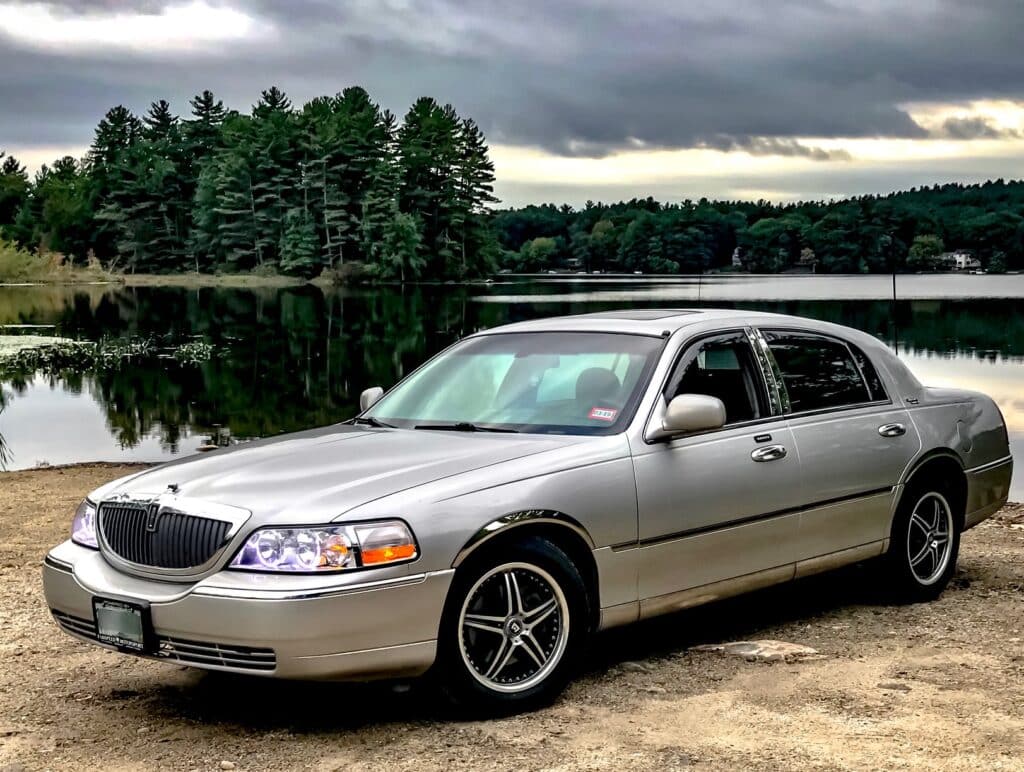The Lincoln Town Car has long stood as a symbol of American luxury, comfort, and reliability. From its inception in the early 1980s, it was designed to offer a driving experience that was as smooth as it was opulent.
Often the choice for limousine conversions and the go-to vehicle for corporate executives, the Town Car has garnered a reputation for timeless elegance and unparalleled ride comfort.
Even as newer models have emerged within Lincoln’s lineup, the Town Car remains a classic, representing the quintessence of what a luxury sedan should be.
When it comes to maintaining such a fine-tuned piece of machinery, every detail matters. One aspect that often gets overlooked but is critical for the longevity and performance of your vehicle is the transmission fluid.
Key Takeaways:
- Importance of Maintenance: Proper transmission fluid maintenance is crucial for the long-term health and performance of your Lincoln Town Car.
- Fluid Capacity: The fluid capacity varies by generation and transmission model. Expect around 12-14 quarts for Town Car, but always consult your manual for specific information.
- Recommended Fluid Type: Typically, Mercon V and Mercon LV ATF are recommended. Always double-check your owner’s manual to confirm.
- Change Intervals: Manufacturer guidelines usually suggest changing the transmission fluid every 30,000-60,000 miles, although this can vary based on driving conditions.
- Signs of Required Change: Recognizable symptoms like rough shifting or a noisy transmission could indicate the need for a fluid change.
- Cost Factors: The average cost of a transmission fluid change can vary depending on location and whether it’s a DIY or professional service.
- Benefits of Recommended Fluids: Using the manufacturer-recommended fluid types minimizes risks and optimizes performance.
- Variable Conditions: If you drive in extreme conditions, you may need to adjust the fluid change intervals accordingly.

The fluid not only lubricates the gears but also helps to keep the transmission system cool and running smoothly.
Neglecting this essential component can lead to costly repairs and decreased performance over time. This guide aims to provide Lincoln Town Car owners with all the necessary details about transmission fluid—types, capacities, and change intervals—so you can enjoy a seamless driving experience for years to come.
1981-1989 Lincoln Town Car Transmission Fluid Capacity And Transmission Fluid Type
The transmission fluid capacity for the 1st Gen Lincoln Town Car varies depending on the specific transmission model installed. It’s typically around 12.3 quarts for a full fluid change, including the torque converter.
| Gearbox | Fluid capacity | Fluid type |
|---|---|---|
| 4-speed AOD | Total fill: 12.3 quarts (11.6 liters) Drain and refill: 3 quarts (2.85 liters) | Mercon/Mercon V |
For the 1st Gen Lincoln Town Car, it’s generally recommended to use Mercon or Mercon V Automatic Transmission Fluid (ATF). Double-check your owner’s manual to confirm the right type for your vehicle.
The manufacturer-recommended interval for changing the transmission fluid in 1st Gen Lincoln Town Cars is approximately every 40,000 miles.
However, these intervals can be influenced by your driving conditions. If you frequently drive in extreme temperatures or tow heavy loads, you may need to change the fluid more often.
1990-1997 Lincoln Town Car Transmission Fluid Capacity And Transmission Fluid Type
For the 2nd Generation Lincoln Town Car, the transmission fluid capacity typically ranges between 12.3 to 13.9 quarts for a complete overhaul.
| Gearbox | Fluid capacity | Fluid type |
|---|---|---|
| 4-speed AOD | Total fill: 12.3 quarts (11.6 liters) Drain and refill: 3 quarts (2.85 liters) | Mercon/Mercon V |
| 4-speed AOD-E | Total fill: 13.6 quarts (12.9 liters) | Mercon/Mercon V |
| 1995+ 4-speed 4R70W | Total fill: 13.9 quarts (13.1 liters) Drain and refill: 5 quarts (4.75 liters) | Mercon/Mercon V |
For a regular fluid change, you might need around 4 to 5 quarts. However, it’s advisable to consult your owner’s manual or a certified mechanic for your specific model and year.
The recommended transmission fluid type for the 2nd Generation models is Mercon V ATF (Automatic Transmission Fluid).
The manufacturer-recommended interval for changing the transmission fluid for the 1990-1997 Lincoln Town Car models is approximately every 40,000 miles.
However, this can vary based on driving conditions, the age of the vehicle, and other factors. If you frequently use your Town Car for towing or drive in severe conditions, more frequent changes might be necessary.
1998-2011 Lincoln Town Car Transmission Fluid Capacity And Transmission Fluid Type
3rd Gen Lincoln Town Car (1998-2002)
For the 3rd Generation Lincoln Town Car models from 1998-2002, the 4-speed 4R70W transmission fluid capacity is 13.9 quarts (13.1 liters) for a complete overhaul. A standard fluid change would require around 5 quarts.
Always consult your owner’s manual or a certified mechanic for exact specifications for your vehicle.
The recommended transmission fluid type for these years is Mercon V ATF. Using the correct fluid is crucial for the proper functioning and longevity of your transmission.
3rd Gen Facelift Lincoln Town Car (2003-2011)
For the facelifted 3rd Generation Lincoln Town Car (2003-2011), the transmission fluid capacity for a complete overhaul is typically between 13.9 quarts. For a regular fluid change, you might need around 5 to 7 quarts.
| Gearbox | Fluid capacity | Fluid type |
|---|---|---|
| 4-speed 4R75E automatic | Total fill: 13.9 quarts (13.1 liters) Drain and refill: 5 quarts (4.75 liters) | Mercon V/Mercon LV |
Mercon LV ATF is the recommended transmission fluid for these models. It’s crucial to use the manufacturer-recommended fluid to ensure the optimum performance and longevity of your transmission.
The recommended interval for changing the transmission fluid remains at approximately every 30,000 miles.
However, as always, this is subject to variables like driving conditions and the age of your vehicle. Frequent towing or driving in harsh conditions may require more frequent changes.
Signs Your Transmission Fluid Needs Changing
It’s vital to keep an eye on specific symptoms that may indicate your transmission fluid needs changing. These can include:
- Sluggish or Delayed Gear Shifting: If your car hesitates or struggles when shifting gears, this could be a sign of old or contaminated transmission fluid.
- Grinding Noises: Unusual sounds like grinding or whining noises when the vehicle is in gear are often a red flag.
- Slipping Gears: If your car unexpectedly changes gears or has trouble staying in gear, this could be a symptom of low or deteriorated transmission fluid.
- Transmission Overheating: Frequent overheating can be a sign of low fluid levels or dirty transmission fluid.
- Warning Lights: Modern vehicles come equipped with sensors that will trigger your dashboard warning light if the transmission fluid temperature is too high or the level is low.
Appearance of Old vs. New Fluid
- New Fluid: New transmission fluid is generally a clear red and has a somewhat sweet or tart smell. It should be translucent and free from any particles.
- Old Fluid: As transmission fluid ages, it turns darker, becoming brown or even black. It may have a burnt smell and could contain metal particles, which are signs of wear and tear on your transmission.
Regularly checking your transmission fluid’s appearance can be an effective way to gauge whether it’s time for a change. If the fluid has significantly darkened or smells burnt, it’s likely time to replace it.
Lincoln Town Car Transmission Fluid Change Intervals
The expected lifespan of transmission fluid varies depending on the type of fluid used and the driving conditions. Generally speaking, conventional transmission fluids may last between 30,000 and 60,000 miles, while synthetic fluids can go up to 100,000 miles.
Manufacturer-Recommended Intervals
It’s crucial to follow the manufacturer’s recommended maintenance intervals for transmission fluid changes. For Lincoln Town Car models, consult your owner’s manual for specific guidance, but many models recommend a fluid change every 30,000 to 60,000 miles.
Impact of Driving Conditions
Driving conditions can significantly impact the lifespan of your transmission fluid:
- Heavy Towing or Carrying Loads: If you often tow trailers or have a heavy load, you might need to change the transmission fluid more frequently.
- Stop-and-Go Traffic: Frequently driving in congested traffic conditions can wear out your transmission fluid faster than usual.
- Hot Climate: Higher temperatures can cause the fluid to break down faster, requiring more frequent changes.
- Off-Roading: Rough terrains can stress the transmission, necessitating more frequent fluid changes.
Because driving conditions vary, it’s a good idea to regularly check the transmission fluid level and condition, and adjust your maintenance schedule accordingly.
Cost of Transmission Fluid Change
The cost of a transmission fluid change for a Lincoln Town Car can vary significantly based on location, labor rates, and whether any additional services (like a transmission filter replacement) are performed.
However, you can generally expect to pay between $100 and $200 for a standard transmission fluid change. For premium services involving synthetic fluid or additional maintenance, the cost could go up to $300 or more.
Several variables can influence the overall cost of a transmission fluid change:
- Type of Fluid: Synthetic fluids tend to be more expensive than conventional ones.
- Labor Rates: Costs can differ based on the mechanic’s labor charges, which often vary by region.
- Additional Services: Some shops may suggest additional services like changing the transmission filter or flushing the entire system, which will add to the overall cost.
- Dealership vs. Independent Shop: Generally, dealerships tend to be more expensive than independent shops for the same service, although they offer brand-specific expertise.
- Coupons and Promotions: Many service centers offer coupons or promotional prices for transmission services, which can help offset costs.















